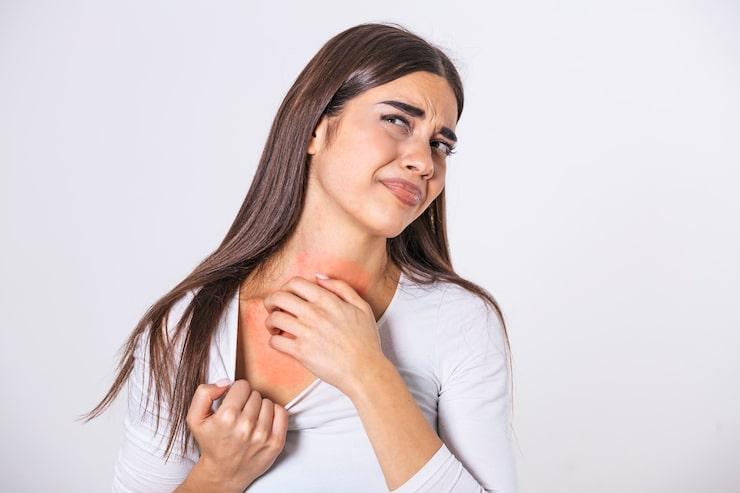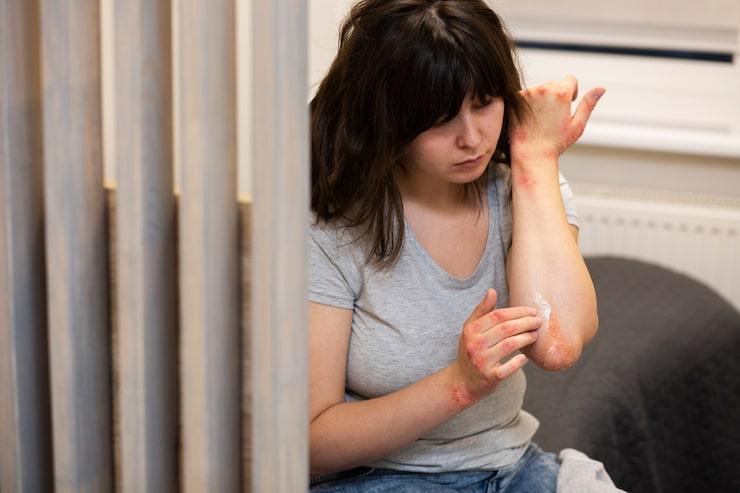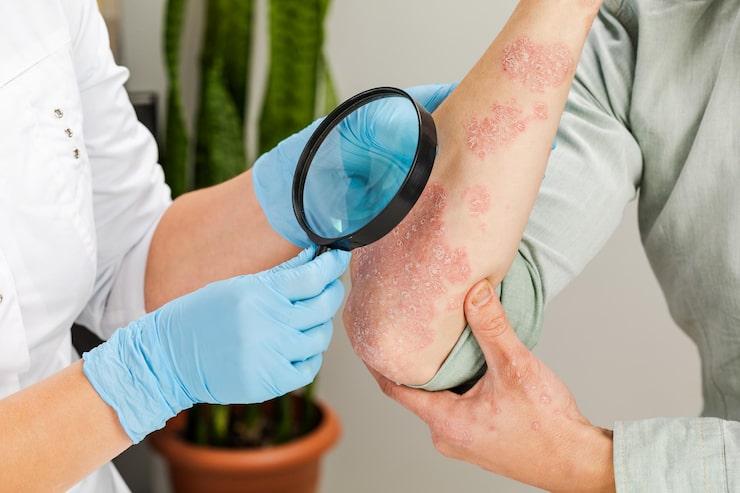How to Find and Treat Eczema
Distressed woman due to raging Eczema
The skin is the largest organ in the body. It keeps things like allergies, infections, and other things that bother the body from getting in. But for millions of people throughout the world, eczema, a long-term skin condition, gets rid of that protective barrier. Atopic dermatitis is the medical word for eczema, which is a common skin condition that can affect people of all ages, from babies to the elderly.
Eczema can't be spread, but its visible symptoms can make you feel uncomfortable, angry, and emotionally drained. The good news is that people with eczema can live comfortably and limit their flare-ups if they know how to detect, treat, and care for their condition.
We'll speak about what eczema is, how to identify if you have it, what causes it, and the best ways to cope with and treat it in this post.
What is Eczema?
Eczema is a skin condition that lasts for a long time and leaves the skin red, dry, and irritating. People with eczema have skin that isn't as strong, so irritants, allergens, and infections can slip through more easily.
We don't know for sure what causes eczema, but we assume it's a mix of:
- Genetics: You are more likely to have eczema, asthma, or hay fever if someone in your family has had it.
- When the immune system overreacts to items that set it off, it generates inflammation.
- Changes in the weather, allergens, and irritants can all make symptoms worse.
Types of Eczema
- There are many kinds of eczema, and each one has its own signs and symptoms:
- Atopic dermatitis is the most common type and is often linked to asthma and allergies.
- contact dermatitis happens when you contact substances that irritate your skin or trigger allergies, like soaps, detergents, or metals.
- When you have dyshidrotic eczema, little blisters occur on your hands and feet.
- Nummular eczema: round, coin-shaped spots that itch and leak.
- Seborrheic dermatitis affects areas of the body with a lot of oil glands, such as the face, scalp, and chest.
- When blood doesn't flow well, usually in the lower legs, it causes stasis dermatitis.
How to Know If You Have Eczema
It's really important to find eczema early so you may treat it properly. The symptoms can change based on the type, age, and severity of the condition. Some common signs are:
- Itching that doesn't go away, which is worse at night and hinders you from sleeping.
- The skin is dry and sensitive, and it feels rough and flaky.
- Red or brown spots often appear on the hands, foot, ankles, wrists, neck, upper chest, and inside the elbows and knees.
- Swelling and Inflammation: The skin may grow hot and swollen during flare-ups.
- Crusting or oozing: In really bad cases, blisters that fill with fluid and pop can make crusts.
- Thickened Skin: Scraping your skin a much might make it leathery
- Adults are more likely to get eczema in the creases and folds of their skin, whereas kids are more likely to get it on their face, scalp, and limbs.
Things That Make Eczema Worse
Woman applying cream on her Eczema
Some items can make the symptoms of eczema worse. If you know these things, you can help stop them from happening:
- Things in the surroundings that set things off
- Very hot or cold temperatures, changes in humidity, and sweating.
- Dust mites, mold, pollen, and pet hair.
- Things that make you mad
- Soaps, shampoos, and cleaners that are overly strong.
- Cosmetics and skin care products that smell good.
- Some fabrics, like polyester or wool, are good.
- Food allergies
- Some of the most common foods that cause allergies are dairy, eggs, soy, peanuts, and wheat.
- Very important for kids with atopic dermatitis.
- Stress
- Stress can make itching and irritation worse.
- Hormone changes
- Women may develop flare-ups while they are pregnant or on their periods.
How to find out whether you have eczema
A dermatologist usually figures out if someone has eczema by looking at their skin, collecting a medical history, and looking at how the symptoms are changing. Allergy testing to find out what is causing the problem is one of the other tests that might be done.
- Testing for contact dermatitis with patches.
- A skin biopsy to rule out alternative options.
What to Do About Eczema
There is no permanent cure for eczema, but you can manage it properly with a combination of skin care, lifestyle changes, medications, and professional treatments.
1. Routine for taking care of your skin every day
- Apply lotion Apply thick creams or ointments (not lotions) at least twice a day.
- For delicate cleaning, use mild, unscented soaps.
- Bathing: Don't take long, hot showers or baths. Just take short, warm ones.
- Pat Dry: After you bathe, gently pat your skin dry and then put on moisturizer right away.
2. Avoiding things that make you angry
- Stay away from items that make you feel bad, like foods, materials, and allergies.
- Put on garments made of soft cotton.
- Keep your nails short so they don't scratch or harm your skin.
3. Medications
- Doctors may tell you to take:
- Corticosteroids for the skin - Stop the itching and swelling.
- Calcineurin Inhibitors (Tacrolimus, Pimecrolimus): Creams that don't have steroids in them for sensitive areas.
- Antihistamines can help you not scratch, especially at night.
- Oral or injectable immunosuppressants are used when other treatments don't work for really bad cases.
- Antibiotics: If you have an infection on your skin.
4. Therapy using light
Moderate to severe cases may improve with regulated exposure to ultraviolet (UV) radiation.
5. New Biologic Treatments
People with severe eczema have high hopes for new biologic drugs like dupilumab. These work on some immune system pathways to reduce inflammation.
Advice about home and lifestyle
Getting proper medical help helps people with Eczema a lot
- Manage stress by doing things that help you relax, including yoga, meditation, or deep breathing.
- Drink enough water to keep your skin hydrated.
- Use a humidifier in the winter or in settings with air conditioning to keep the air from being too dry.
- Changes to the diet: Some people feel better when they quit consuming things that make them allergic.
- Eczema in Kids: Kids are more likely to have eczema, and flare-ups can be painful on the child and the family. Here are some key tips for parents:
- Use baby things that are not too strong and don't smell.
- If you have short nails, you won't damage yourself when you scratch.
- Dress your youngsters in garments that are comfortable and let air through.
- If you get flare-ups a lot, you should consult a pediatric dermatologist to get tested for allergies.
How Eczema Affects Your Mood
Eczema hurts more than only the skin; it also hurts mental and emotional wellness. Itching that won't go away, rashes that are plain to notice, and difficulties sleeping can all make you feel irritated, anxious, or even sad. When you're attempting to deal with something, counseling, support groups, and being open with family and friends can all help a lot.
When to See a Dermatologist
- You can treat minor eczema at home, but you should contact a doctor if:
- When there is pus, swelling, and pain, it means you have a skin infection.
- It can be hard to sleep or do your normal activities when you have flare-ups.
- The patient is a child who has symptoms that come back or are very bad.
Conclusion
Eczema is a hard skin disease, but you can manage it. Recognizing symptoms early, knowing what causes them, and following a regular skincare routine are all crucial steps in managing it. With the help of dermatologists, medications, and adjustments to their way of life, most people can drastically reduce flare-ups and enjoy healthier, happier skin.
Don't wait to receive medical help if you or your child have eczema. With professional help, patience, and taking care of yourself, you can get your life back on track and improve your quality of life. Make sure to contact seasoned professionals like Dr. Mohna Chauhan at Prakash Hospital, Noida, for more insight.



